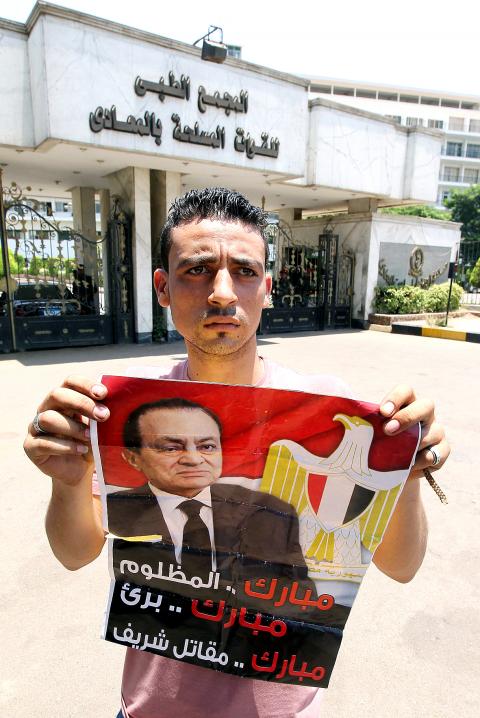Former Egyptian president Hosni Mubarak was in a coma yesterday, but off life support, and his heart and other vital organs were functioning, according to officials.
Overnight, state media reported that the 84-year-old former president, ousted in last year’s uprising and now serving a life sentence in prison, suffered a stroke and was put on life support. He was transferred to a military hospital from the Cairo prison hospital where he has been kept since his June 2 conviction and sentencing for failing to stop the killing of protesters during the uprising.
His wife, Suzanne, was by his side in the Nile-side hospital in Maadi, a suburb just south of Cairo.

Photo: EPA
The security officials said a team of 15 doctors, including heart, blood and brain specialists, was supervising the condition of Mubarak, who needed help with his breathing. The officials spoke on condition of anonymity because they were not authorized to speak to the media.
State news agency MENA had earlier said the ousted president had been declared clinically dead after suffering a stroke in prison and being transferred to hospital.
“Hosni Mubarak is clinically dead,” the report said. “Medical sources told MENA his heart had stopped beating and did not respond to defibrillation.”
Mubarak’s health scare comes at a time of heightened tension in Egypt. Both candidates in a fiercely contested presidential runoff held last weekend are claiming victory. At the same time, the ruling military council that took over from Mubarak moved to tighten its grip on power a little more than a week before they were supposed to transfer complete authority to an elected civilian administration.
The ruling generals stripped the next president of many of his powers in a declaration made just as polls closed in the runoff late on Sunday night. With the decree, they gave themselves control over the drafting of a new constitution and declared themselves the legislative power after a court last week dissolved the Islamist-dominated parliament, which was freely elected about six months earlier.
The runoff pitted Mubarak’s last prime minister, Ahmed Shafiq, against conservative Islamist Mohammed Morsi of the Muslim Brotherhood. The contest divided the country and their rival claims of victory could bring more of the turmoil that has rocked the country since Mubarak’s ouster.
Mubarak was convicted of failing to prevent the killing of about 900 protesters during the 18-day uprising that forced him out of office on Feb. 11, last year.
Conflicting details of Mubarak’s condition were filtering out on Tuesday night at a mass demonstration in Cairo’s Tahrir Square.
“It’s divine retribution,” teacher Saber Amr said. “God doesn’t forgive those who do wrong to their people. God doesn’t forgive those who kill innocents.”
Nearby, Abdel Mottaleb, a Muslim Brotherhood supporter, offered a more conciliatory tone.
“We are Muslims. We respect the dead, regardless,” he said. “God will judge him.”

TRAGEDY STRIKES TAIPEI: The suspect died after falling off a building after he threw smoke grenades into Taipei Main Station and went on a killing spree in Zhongshan A 27-year-old suspect allegedly threw smoke grenades in Taipei Main Station and then proceeded to Zhongshan MRT Station in a random killing spree that resulted in the death of the suspect and two other civilians, and seven injured, including one in critical condition, as of press time last night. The suspect, identified as a man surnamed Chang Wen (張文), allegedly began the attack at Taipei Main Station, the Taipei Fire Department said, adding that it received a report at 5:24pm that smoke grenades had been thrown in the station. One man in his 50s was rushed to hospital after a cardiac arrest

SAFETY FIRST: Double the number of police were deployed at the Taipei Marathon, while other cities released plans to bolster public event safety Authorities across Taiwan have stepped up security measures ahead of Christmas and New Year events, following a knife and smoke bomb attack in Taipei on Friday that left four people dead and 11 injured. In a bid to prevent potential copycat incidents, police deployments have been expanded for large gatherings, transport hubs, and other crowded public spaces, according to official statements from police and city authorities. Taipei Mayor Chiang Wan-an (蔣萬安) said the city has “comprehensively raised security readiness” in crowded areas, increased police deployments with armed officers, and intensified patrols during weekends and nighttime hours. For large-scale events, security checkpoints and explosives

A car bomb killed a senior Russian general in southern Moscow yesterday morning, the latest high-profile army figure to be blown up in a blast that came just hours after Russian and Ukrainian delegates held separate talks in Miami on a plan to end the war. Kyiv has not commented on the incident, but Russian investigators said they were probing whether the blast was “linked” to “Ukrainian special forces.” The attack was similar to other assassinations of generals and pro-war figures that have either been claimed, or are widely believed to have been orchestrated, by Ukraine. Russian Lieutenant General Fanil Sarvarov, 56, head

PUBLIC SAFETY: The premier said that security would be tightened in transport hubs, while President Lai commended the public for their bravery The government is to deploy more police, including rapid response units, in crowded public areas to ensure a swift response to any threats, President William Lai (賴清德) said yesterday after a knife attack killed three people and injured 11 in Taipei the previous day. Lai made the remarks following a briefing by the National Police Agency on the progress of the investigation, saying that the attack underscored the importance of cooperation in public security between the central and local governments. The attack unfolded in the early evening on Friday around Taipei Main Station’s M7 exit and later near the Taipei MRT’s Zhongshan